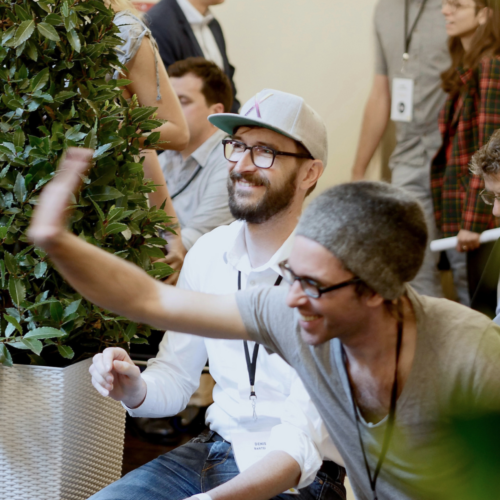“Neoliberalism is uncaring by design”, writes the Care Collective in The Care Manifesto, a book on the politics of interdependence. “Dependence on care has been pathologised, rather than recognized as part of our human condition”, therefore normalising care and bringing care-practices into social movement culture is one step at embracing interdependencies and nurturing one another rather than contributing to collective burn out. At Guerrilla, we see relationality and well-examined, social entanglements at the heart of both grassroots and 0.1% wealth-holder organising.
Most explicitly, Boiling Point (Wrzenie), a queer-care collective in Poland, have been centering mental health support, burn-out prevention and the spreading of tools & practices that protect, safeguard and offer healing resources especially for trans youth & queer people in the countryside. They put together a publication about safe activism, ran a burn-out camp for LGBTQ+ activists, and organised ad hoc support for displaced Ukrainian queer people arriving in Poland.
Care is a re-emerging topic in several of our Deeper Inquiry sessions, most notably on the Embodied Revolution with Skeena Rathor and the Feministisation of Politics with Maria Francesca de Tullio & Irene Zugasti. Investing time and effort into relationships is what leads to resilient, long-term allyship. Skeena’s insights from her work in tending to the vision of Extinction Rebellion, highlights the importance of grief, acknowledging the collective pain body and the vast inequities between global south and north that breed wider social/ecological harms. She says, “we need to organise at the speed of trust”, trust being at the core of building deep, functional relationships – an honest critique behind some of XR’s major shortcomings. In addition, the narrative of feminised politics, a core tenet of radical municipalism, brings many questions around care into how we conduct political organising. Anti-patriarchal practices shape how we run meetings, how parental duties are accommodated in the workplace, and how mental health is conceived politically.
This year we also started a novel collaboration with writer & researcher Anthea Lawson who is mapping out patterns and trends in varied European activist scenes with one clear cluster of inquiry being burnout and how to curb it. And not just curb it, but create an entirely different culture, one that doesn’t lead to burnout by default. These discussions have inspired us on our own journey and organisational transformation as we aspire to align our political values and organisational practices through what we call Care-illa (stay tuned 🙂
Grantees such as Index, the police accountability lab which uses tech to dig up evidence and support cases of police brutality in France, an off-shoot of Forensic Architecture, is modeling citizen care – peer-to-peer support between citizens when the state fails to protect and serve. Moreover, this type of work supports wider, ecosystemic movement health, the space to dissent, the right to protest, the freedom to oppose injustice. Here work of groups such as Index and Article 11 Trust is absolutely essential. They ensure that laws protect people and allow civil disobedience to continue as an essential part of democratic discourse and worldbuilding. Care emerges as an underlying theme in “Defending Dissent” with Kevin Blowe, caring for social justice means also caring about the laws and systems that allow us to safeguard it.
Indeed, care takes on many forms and guises. The Care Manifesto continues, “The decimation of public spaces renders a sense of communal life increasingly difficult. There are fewer places for people to congregate, whether for relaxation and enjoyment, or to discuss issues of common concern or participate in collaborative projects. This heightens the competitive individualism that so often leads to loneliness and isolation, while having devastating repercussions for our ability to participate in democratic decision-making”. Countering care-deprivation or care-commodification comes with consistent practice, consistent collective accountability and consistent exchange and encounters, most aptly modeled by New Visions, a group that runs various feminist, relational events and that weave care throughout their sociopolitical offerings.
Thus a robust antidote to corrosive individualism, will be composed of a varied-care-practice kit, partly anchored in pragmatism and partly in idealism, and this open action research we’re calling Care-illa, is just that, applied methods of collective care (that we’re either testing ourselves or people within our ecosystem are sharing). We will creatively analyse, depict and openly-source whatever insights we reach from this carebear investigation, so that movement builders and resourcers can use it either as a launchpad for collaborative research or a nifty tool to define and deepen one’s commitment to care – that so radical and still oft-overlooked political act.


